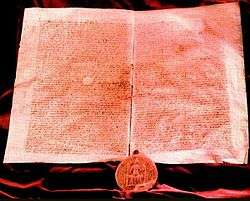Golden Bull of 1222

The Golden Bull of 1222 was a golden bull, or edict, issued by King Andrew II of Hungary. King Andrew II was forced by his nobles to accept the Golden Bull (Aranybulla), which was one of the first examples of constitutional limits being placed on the powers of a European monarch.[1] The Golden Bull was issued at the year 1222 diet of Fehérvár.[2] The law established the rights of the Hungarian nobility, including the right to disobey the King when he acted contrary to law (jus resistendi). The nobles and the church were freed from all taxes and could not be forced to go to war outside of Hungary and were not obligated to finance it. This was also a historically important document because it set down the principles of equality for all of the nation's nobility.[3] Seven copies of the edict were created, one for each of the following institutions: to the Pope, to the Knights Templar, to the Knights Hospitaller, to the Hungarian king itself, to the chapters of Esztergom and Kalocsa and to the palatine.
The charter's creation was influenced by the emergence of a nobility middle class, unusual in the nation's feudal system. As a regular gesture of generosity, King Andrew often donated property to particularly faithful servants, who thereafter gained new economic and class power. With the nation's class system and economic state changing, King Andrew found himself coerced into decreeing the Golden Bull of 1222 to calm the waters between hereditary nobles and the budding middle class nobility.[4]
The Golden Bull is often compared to Magna Carta; the Bull was the first constitutional document of the nation of Hungary, while Magna Carta was the first constitutional charter of the nation of England.[3] It may even have been inspired by Magna Carta, as its greatest supporters met with exiled Magna Carta leaders such as Robert Fitzwalter during the Fifth Crusade.[5]
Main points of the Bull
- No nobleman may be arbitrarily arrested, nor can he be oppressed by the desire of any higher power.
- The Noblemen are declared to be exempt from the payment of taxes, nor will money be collected from their treasuries. Neither will their residences be occupied, nor their villages, and these may only be visited by those who have been invited. No taxes will be levied on the Church.
- If any nobleman dies without a male heir, his daughter will receive a quarter of his possessions; the remainder of his property shall be given to others, but if, as a result of their deaths, they cannot take possession of these properties, then these properties shall pass into the hands of their closest living relative; if this is not possible, then the King shall inherit them.
- If the King wishes to send his armies outside of the Kingdom the Noblemen will not be under obligation to go with him, if the monarch doesn't pay them. However, if an invading army enters in the Kingdom, all of them must serve to expel it.
- The Hungarian Palatine may judge everyone in the Kingdom without any differentiation; but he cannot take try any nobleman without the King's approval.
- If foreigners arrive in the Kingdom, they must not receive honors and public positions without the Royal Council's approval.
- No title or public charge can be inherited.
- No Jew or Ismaelite can hold a public position (job). The Nobles of the Chamber, those working with monies, tax collectors and toll-keepers may only be Hungarian noblemen.
- Hungarian properties cannot be given to foreigners.
- No-one, besides the Hungarian Palatine, the governors of Croatia and Slavonia, the King and the Queen Consort, can have more than one title or honor.
- In order for this document to be lawful, and implemented in the future, seven copies of it will be made, each sealed with the Golden Seal. The first will be sent to the Pope, the second to the Knights of Saint John, the third to the Templar Knights, the fourth to the King, the fifth to the archbishop of Esztergom, the sixth to the Archbishop of Kalocsa and the seventh to the Hungarian Palatine, so that these writings won't be falsified or confused.
See also
References
Literature cited
- Kormos, Laszlo (4 October 2005). "Hungary's Golden Bull of 1222". HUNSOR: Ungersk-Svenska Online Källor. Retrieved 7 January 2010.
- Molnar, Miklos (2001). A Concise History of Hungary. Cambridge University Press. ISBN 0-521-66142-0.
- Ronay, Gabriel (1978). The Tartar Khan's Englishman. London: Cassel. ISBN 1-84212-210-X.
External links
- The Full Text of the Laws (Hungarian)
- Martyn Rady, 'Hungary and the Golden Bull of 1222'